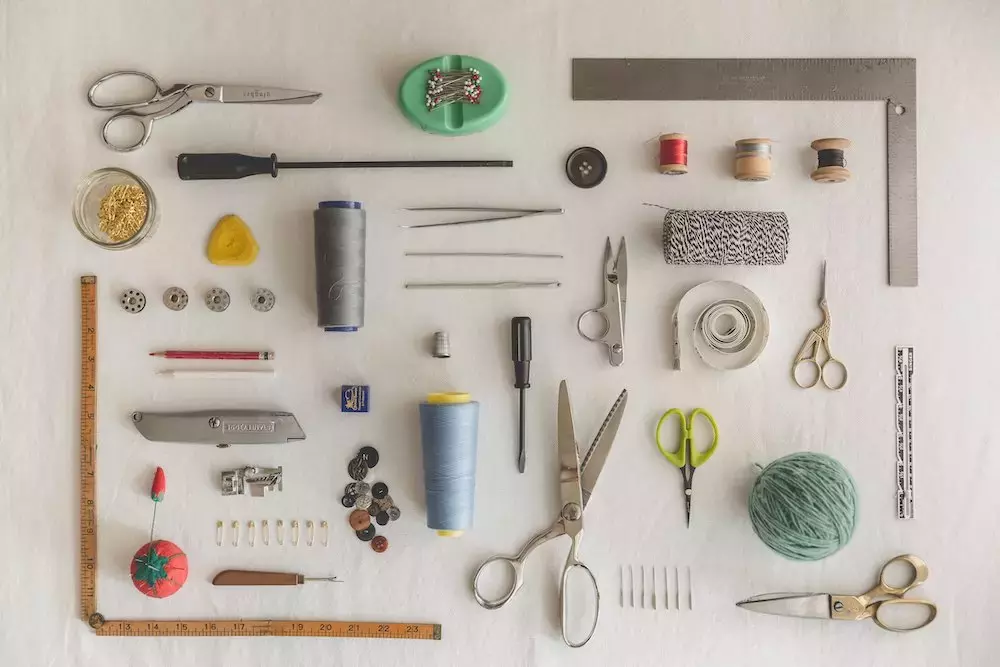10 Essential Tools for Your First Sewing Kit
2020-05-18
Whether you are putting together a sewing kit from scratch or buying one that is put together for you, there will be some essential tools you will need to purchase.
Even the pre-assembled sewing boxes always seem to have something missing. It is far better to put together your own, so you can be sure you have everything you need.
With these ten tools, you should have no problem handling nearly any project!
Chalk or Fabric Marker
Some people argue that you need both chalk and a marker, but this is not necessarily true. One or the other is perfectly fine. The chalk is better for transferring pattern markings, but it’s only easy to handle on dark fabrics.
A fabric marker, which is usually purple or blue, will show up most fabrics. They wash away with water and are generally more comfortable to use than chalk because the lines don’t disappear from accidental rubbing.
Every sewing kit should have one of these two items, but if you are looking for something more versatile, the fabric marker will do the job.
Measuring Tape
The flexible plastic measuring tape helps measure the lengths of fabric, the person the item will be made for, and adjustments for changes in your project.
You could certainly purchase a set of plastic rulers, but these measuring tapes will often go to 6-feet or more and are much easier to handle and store than plastic rulers.
Almost every project you work on will involve measuring in some form, so be sure your sewing kit has a flexible measuring tape.
Seam Gauge
The YouTubers you watch who have been sewing for years may be able to just eye a 1/4-inch seam, but as a beginner, you should trust the ruler more than your judgment.
A seam gauge is a simple metal tool that has a sliding plastic bit. You slide the bit back to your measurement and mark a few places along the edges.
Now you know that your seams are even and exact.
Seam Ripper
You will make mistakes; we all do. Even professional garment makers and quilters make mistakes and turn to their handy seam ripper.
Seam rippers are also great if you want to alter an item of clothing.
While you can get a seam ripper for just a few dollars, it’s nice to have various types. The rippers with the red ball help protect your fingers and your fabric. Other seam rippers will come with a point turner on the other end, which is also handy!
Fabric Scissors
A must-have for sewers of every fashion, your scissors are essential. Most projects will need some fabric cutting, so don't get caught without yours!
Getting a pair of fabric scissors is the introductory part of the craft. You don't need the fanciest pair, just make sure that you only use them on fabric!
Needles (for your Machine and Hand-Sewing)
When putting together your sewing kit, you absolutely need a variety of needles for your sewing machine. Always make sure that they’re fit for your model or brand, and generally, you want a standard size, and then something for denim or and other thick fabrics.
Your sewing box should also always have a small collection of hand-sewing needles. When it comes to finishing off small openings or other small details, you’ll need these needles.
Additionally, if you’re putting buttons on anything, it’s always easier to do it yourself then to fiddle with the foot for buttons.
Thread
There are a lot of different kinds of threads out three, and you are going to need a variety. You will need a thread that matches and a thread that contrasts with your project.
Building up a substantial thread collection isn't very complicated, and it can even be a bit of fun.
Start with the basics. Get a spool of thread that matches or complements your current project, and then black and cream/white. That's all you need to get started.
Keep in mind that with thread, you always get what you pay for, so cheap thread will break and fray at the ends easily. However, a thread you spend a bit more on will typically be stronger and more stable.
Pins or Clips
There’s a great debate between the time tested pins and the new-age clips. Go with what works for you, or have a small bit of both. Either way, you will need at least one of them in your sewing kit.
Also, keep in mind that pins and clips aren’t as cheap as you might expect, so keep track of them!
Pin Cushion or Magnet
Pincushions are a must, but if you can, find one with a magnetic strip. A magnet makes it easy to pick up dropped pins, or even find lost pins in the carpet. Finding a pin with a magnet will save you from finding it with your foot later on!
Either way, a pincushion is the only way to store pins that almost ensure you don’t get pricked.
Rotary Cutter and Mat
Okay, this is technically two things, but you really shouldn’t use a rotary cutter without a mat. You can put off buying a rotary cutter for a while, but it’s well worth the purchase.
A rotary cutter not only saves you time, but it helps beginners tremendously. With a rotary cutter, it’s easy to make extraordinarily straight cuts, and you can cut through multiple layers of fabric at a time.
Build Your Sewing Kit with GoldStar Tool!
GoldStar Tool has everything you need to begin your first sewing kit. Once you have all your tools, you will be ready to start your first project, and we can’t wait to see what you’ve done with it.
Be sure to share your creations with us on Instagram and tag us to show off what you’ve made!





